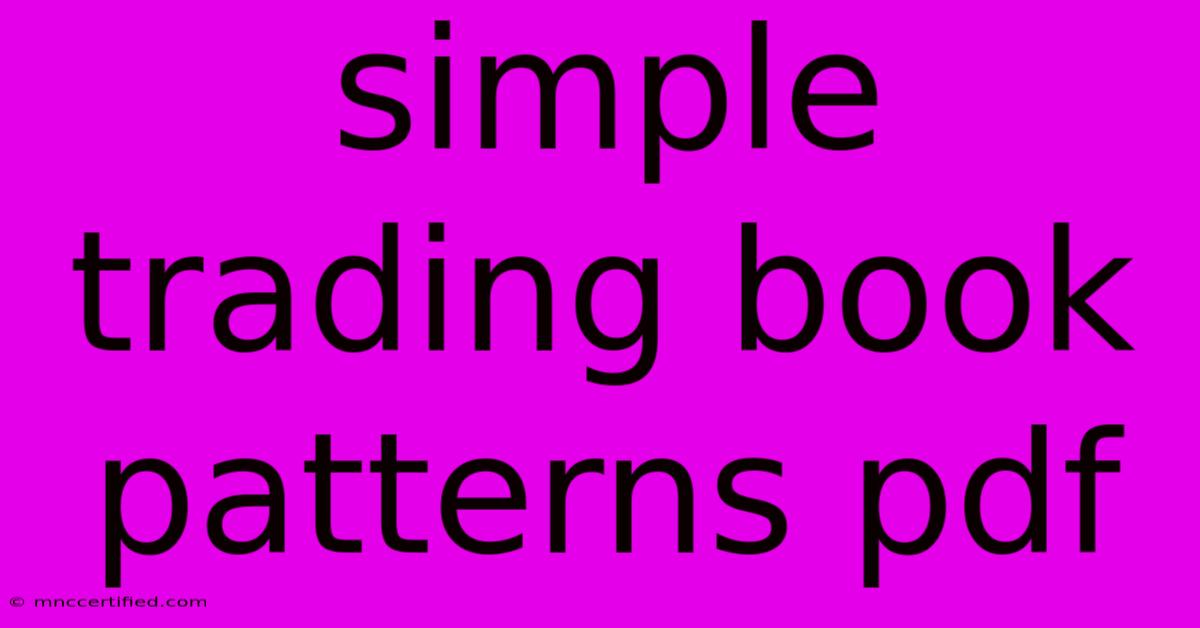Simple Trading Book Patterns Pdf

Table of Contents
Simple Trading Book Patterns: A Comprehensive Guide (PDF Resources Included)
Are you looking to improve your trading strategies and learn to identify profitable opportunities? Understanding chart patterns is crucial for any successful trader. This comprehensive guide explores simple trading book patterns, providing you with the knowledge to interpret them and make informed decisions. We'll explore several key patterns, offering explanations and visual examples, and point you towards valuable PDF resources to further enhance your learning.
What are Chart Patterns?
Chart patterns are recurring formations on price charts that indicate potential shifts in market momentum. They are visual representations of how traders behave under specific market conditions, offering clues about future price movements. While not foolproof predictors, recognizing these patterns can significantly improve your trading accuracy and risk management. Identifying these patterns effectively requires practice and a keen eye for detail.
Simple Trading Book Patterns Every Trader Should Know
Several fundamental chart patterns are relatively easy to identify and interpret, forming the bedrock of technical analysis. Let's dive into some of the most common:
1. Head and Shoulders Pattern
This classic reversal pattern signals a potential trend reversal. It's characterized by three distinct peaks: a central peak (the "head") flanked by two smaller peaks (the "shoulders"). A neckline connects the troughs between the peaks. A break below the neckline typically confirms a bearish reversal. The target price is often estimated by measuring the distance between the head and the neckline and projecting it downwards from the breakout point.
Identifying the Head and Shoulders Pattern: Look for a clear formation with distinct peaks and a defined neckline. Confirm the pattern with other technical indicators for a stronger signal.
2. Double Top and Double Bottom Patterns
These patterns represent potential trend reversals. A double top consists of two similar price highs followed by a lower low, signaling a potential bearish shift. Conversely, a double bottom displays two similar price lows followed by a higher high, suggesting a bullish reversal. Breakouts above (double bottom) or below (double top) the pattern's neckline usually confirm the reversal.
Identifying Double Top and Double Bottom Patterns: Pay close attention to the price levels of the highs and lows. Ensure the peaks and troughs are relatively close in price for confirmation.
3. Triangles
Triangle patterns represent periods of consolidation. They are characterized by converging trendlines, creating a triangle shape on the chart. There are various types, including symmetrical, ascending, and descending triangles, each with its own implications for future price movements. Breakouts above (ascending or symmetrical) or below (descending or symmetrical) the triangle often indicate a continuation or reversal of the prevailing trend.
Identifying Triangle Patterns: Focus on the converging trendlines. Observe the breakout direction to predict the likely future price movement.
4. Flags and Pennants
These patterns often appear within strong trends, representing temporary pauses or consolidations before the trend resumes. Flags are characterized by a rectangular consolidation, while pennants are more triangular. Breakouts from these patterns usually confirm a continuation of the existing trend.
Identifying Flags and Pennants: Look for these patterns within established trends. Note the direction of the breakout to confirm trend continuation.
Where to Find More Information (PDF Resources)
While this guide provides a basic understanding, further study is essential for mastery. Many excellent resources are available online, including:
- Search for "Technical Analysis PDF" or "Chart Pattern Recognition PDF": Numerous websites and educational platforms offer downloadable PDFs detailing chart patterns and technical analysis strategies. Remember to critically evaluate the source's credibility.
- Brokerage Firm Educational Materials: Many online brokers provide educational materials, often including PDFs on chart patterns and trading strategies. Check the resources sections of reputable brokerage websites.
- University and Financial Institution Resources: Some universities and financial institutions offer free or paid courses with downloadable materials, potentially including PDFs on technical analysis.
Disclaimer: Trading involves significant risk. The information provided in this guide is for educational purposes only and should not be considered financial advice. Always conduct thorough research and consider your risk tolerance before making any trading decisions.
Conclusion
Mastering simple trading book patterns is a crucial step in improving your trading skills. By understanding these patterns and combining them with other technical and fundamental analysis tools, you can significantly improve your trading performance. Remember to utilize the recommended resources to deepen your knowledge and practice diligently. Successful trading takes time, dedication, and continuous learning.

Thank you for visiting our website wich cover about Simple Trading Book Patterns Pdf. We hope the information provided has been useful to you. Feel free to contact us if you have any questions or need further assistance. See you next time and dont miss to bookmark.
Featured Posts
-
Piers Morgan Mocks Ellens Decision
Nov 22, 2024
-
Captain Tom Charity Ex Boss Shocked
Nov 22, 2024
-
Gaetz Withdraws As Trumps Ag Pick
Nov 22, 2024
-
Wsp Grant Services Led By Coral Torres Cruz
Nov 22, 2024
-
Investment Return Crossword Clue
Nov 22, 2024